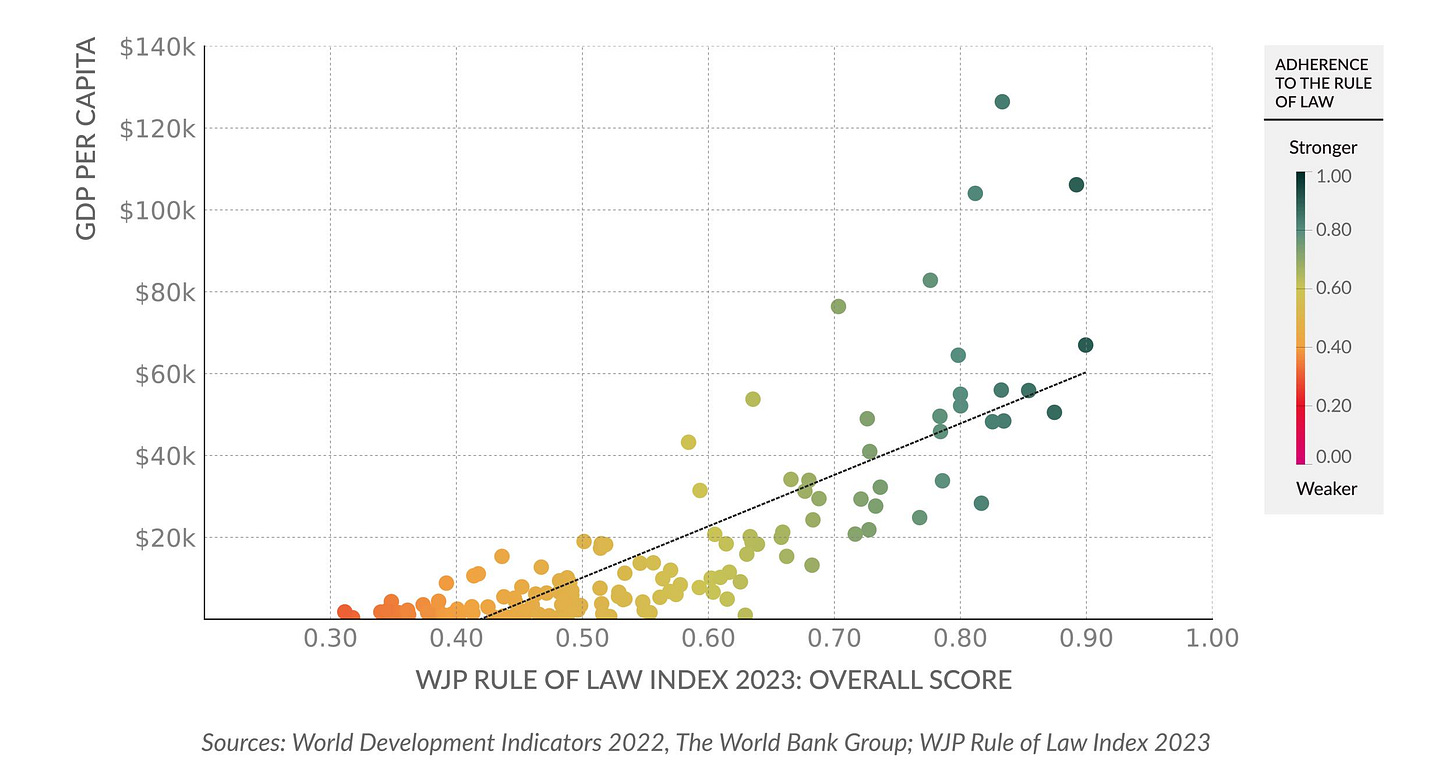Every country should be rich. This is how.
If you want happy people, give them strong institutions.
I’m working on an article with a framework on how to critique capitalism effectively. In that process I’m noticing a few things that I take for granted that those around me find counter intuitive.
Those include the questions:
What makes people happy
What causes countries to be rich
This short article is a concise layout of how I think about those things. TL;DR: clear and enforced rules make places rich, and being rich makes people happy.
Rich countries are happy countries
I’m not sure why this one is controversial, but apparently it is:
If you don’t have food and shelter, that makes you less happy
If you struggle more than you want, you will be less happy
Money doesn’t solve all problems, but it solves a lot of them.
This is not a gut feeling I have, nor an ideological position. There is a well-researched metric that a 5 year old can understand: you can ask people if they are happy. And guess what, asking people if they feel happy is easy research to do, so it has been done.

A few things should stick out on this chart:
People in rich countries report themselves happier than those in poor countries
There is still variation (e.g. see Lebanon and Vietnam), so money is not the only thing that matters
The correlation is so clear you can see it with your naked eye
There are plenty of criticisms of a chart like this, ranging from “GDP is an imperfect measure” to “correlation doesn’t mean causation”. Using those to dismiss this chart is a simple denial of a reality that most people know for a fact: being poor is less nice than being rich.
The simple fact is that given what we know about human psychology, seeing this chart should be a “yeah duh” moment not a “but but” moment.
Stable countries are rich countries
If you don’t know if you can rely on the rules, you can’t plan ahead. Without stable courts, law enforcement, and other institutions building a complex system (like an advanced economy) is almost impossible.
This is again a well-researched fact.

A few thing stand out in this chart:
Better rule of law correlates very strongly with wealth
The benefit increases more and more as you become more stable
Again the effect is so obvious and unsubtle that you can see it with the naked eye
Countries aren’t rich or poor because of a lack of natural resources, or because people there are exceptionally unintelligent, or because they are being plundered by other nations. Injustice in the world exists. Historical injustices do too. But in the context of prosperity they are shiny objects that distract from what really matters: strong rule of law.
If you (like me) are from a rich western nation, you might scoff at this. “Pff you are blowing things out of proportion”. I invite you to look up why Argentina, which has HUGE oil and gas reserves, commonly has lines at their gas stations due to shortages. And then ask ChatGPT whether that kind of thing is exceptional or the norm globally1.
I want everyone to be rich
My base attitude is that human happiness is good, perhaps the highest of goods. Knowing that making people wealthy achieves that, I want every country in the world to attain wealth. Knowing what we do about stable institutions and their effect on wealth, I can’t do anything other than wish strong and predictable institutions upon everyone.
I occasionally have a friendly argument with people who say things like “but economic growth isn’t everything”, and seem to imply that we need to make people happier and healthier without economic growth.
This is a weirdly neocolonial and paternalistic impulse, implying that “we” know better than those poor undeveloped nations. That those nations are being foolish by pursuing economic growth.
The facts are simple: if you want happiness, grow the economy. If you want to do that, make stable institutions.
This is not arcane knowledge
If the above data is new to you, this is not because the research is new or groundbreaking. It’s the kind of thing that is well known in circles of those who study the health and wealth of nations. A good introduction to thinking about this is the book “Why nations fail” by Acemoglu and Robinson.
The data is out there. Unhidden. I’ll leave you with a collage of a few African nations bordering each-other:
Ok fine I’ll save you the time. The government stole the companies doing gas/oil extraction from their shareholders. This dried up investments in infrastructure by oil companies because they feared that whatever they built would just be stolen by the government. Without those companies building extraction equipment, the resources stay in the ground and Argentina can’t use them. At the time of writing their current leader Milei is trying to fix this, so we’ll see where that goes.



